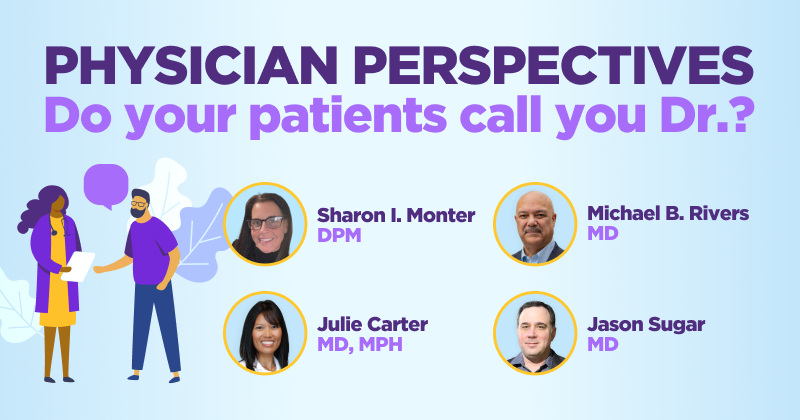Physician Perspectives: An Insightful Conversation on Using First Names in the Exam Room

Delve into the nuances of professional titles and their impact on doctor-patient relationships and engagement
Have you noticed how more and more passengers are boarding planes in pajamas or the growing number of professionals wearing jeans to the office? It would seem that society is experiencing a decline in formality, and this trend might be trickling into the exam room. Researchers are exploring the dynamics of patients who address physicians by their first names, while some doctors are debating how to react when patients drop their formal titles.
It’s also more important than ever for physicians to collaborate with patients and build trusting relationships. So, we asked a panel of on-staff ModMed® physicians for their take on this shifting norm in the doctor-patient relationship. Are certain doctors more likely to be addressed by first name? What are the ramifications for the patient, physician and patient engagement?
ModMed: Why do some doctors insist on formal titles?
Dr. Sharon I. Monter: I think female doctors are addressed by their first name much more than their male counterparts. Although we wore identical attire as residents, I clearly remember my male colleagues being addressed as “Doctor” while I was consistently called “Nurse.” Today, when I see patients in the hospital, nursing home or my practice, I introduce myself as Dr. Monter. The majority of my patients will address me that way. My feeling is that we should all be addressed by the title we worked very hard to achieve.
Dr. Michael B. Rivers: I am not female. I am black. I understand that some women physicians want to be addressed by their formal titles. There’s a problem with women being perceived as nurses, not doctors. It is important for me, however, to disabuse the patient of any confusion right off the bat. When greeting new patients, I say, “I am Dr. Rivers, and I will be taking care of you.” Once that uncertainty is resolved, I leave it up to my patients.
Dr. Julie Carter: Patients rarely address me by my first name if they know I am a physician. For example, if they have been referred to me as a gastroenterologist and come to my office to see me, they will address me as “Doctor.” However, if I walk into a patient’s room in the hospital, they assume that I am anyone other than the doctor; I’m the nurse, the aide, the phlebotomist, etc. I believe this is influenced primarily by my gender and my ethnicity. My experience as a woman of color and medical doctor can’t be separated. First, I need to be recognized as a physician before even worrying about whether patients use formal titles or not. I would never introduce myself as “Dr. Julie” or “I’m Julie Carter, your physician.” Men can do it 100% of the time. It just would not work for someone like me. I always introduce myself to patients as Dr. Carter to set the stage. I want them to understand the value and knowledge I’m bringing to our doctor-patient relationship and my role in that relationship.
Dr. Jason Sugar: Patients very rarely address me by my first name. If they do, it doesn’t bother me; I just move on. Of course, it’s easy for me to say it’s not a big deal. I’m a white, middle-aged man. It would probably bother me much more if I were a woman or person of color.
Should doctors use first names with clinical care teams?
Dr. Monter: Wherever I’ve worked, the staff has always referred to the doctors as “Doctor” in front of patients, which I feel is important. Very rarely did my staff call me by my first name. When they did, it was in a social setting, and it wasn’t easy for some to do. Among colleagues, first names are always OK.
Dr. Rivers: I always had my staff call me Michael, but not in front of patients. If I’m not doing a good job and earning my team’s respect, then having them call me Dr. Rivers doesn’t fix that. For years, I’ve called my chief of operations by her first name, and she does the same with me because we’re equals. That I went to medical school doesn’t take away from the fact that she’s been chief of operations for years at a business with $90 million in revenue.
Dr. Carter: In a clinical setting with a patient, it’s important that I introduce myself as Dr. Carter and that the staff around me use my formal title. This is important so that patients clearly understand my role in their care. Outside of patient interactions, my staff, colleagues and I are on a first-name basis.
Dr. Sugar: I’ve asked my staff and coworkers to call me by my first name when we’re not in front of patients, but they won’t do it. I understand. If one of the doctors they deal with does mind, they might slip. It’s probably easier for the staff to have one rule for all the physicians.
Learn how to strengthen communication skills as a healthcare leader.
Why should doctors avoid correcting patients?
Dr. Monter: Interestingly, I have an older patient who calls me Sharon. She is always respectful, we have a great professional relationship and I will never ask her to call me Dr. Monter. I’ll just ignore it. A few years ago, I was sitting in my doctor’s waiting room when I watched him go off the rails because a patient addressed him by his first name. “I’m not your friend,” he yelled in front of everyone. “I’m your doctor.” This was extremely difficult to watch. I understood what he was saying and how he was feeling, but I didn’t like how he handled the situation. If doctors get to the point where insisting on a title interrupts how we interact with our patients, we have a huge problem.
Dr. Rivers: However my patients feel comfortable addressing me is appropriate as long as we get to a certain level of trust. It will be a very contentious relationship if they don’t trust me. There are times after surgery when I need my patients to follow specific directions. I might ask them to look at the floor for 10 days because I put a bubble in their eye to fix a retinal detachment. In such a case, noncompliance could lead to a challenging recovery and compromise the surgery’s success.
Dr. Carter: I don’t believe doctors should correct patients just to have them call you by a formal title. In my experience, that leads to a breakdown of the relationship. The patient may think you care more about your title than caring for them. For that reason, I don’t correct patients if they call me Julie or Dr. Julie.
Dr. Sugar: It would be more awkward to insist that a patient call me Dr. Sugar. I would rather ignore it. I don’t know that everyone feels that way, though. I can see why some physicians think as a doctor, you’re there to provide a professional service — you’re not socializing with your patients. But if it does happen, this shouldn’t change how you deliver care, regardless of how your patients act or what they say.
How might doctors recognize hidden assumptions and become better allies?
Dr. Monter: There are differences in how men and women grow up and the experiences they have along the way. I know some doctors will ask their patients to call them Dr. Joe or Dr. Bob. I’ve had patients ask me if they can call me Sharon. It’s hard to say no, so I say, “You can call me whatever you want” — even though it’s not my first choice. We’re living in a time when identity is very important to everyone, and people are struggling to be seen for who they are. The respect needs to go both ways, of course.
Dr. Rivers: Twenty years ago, I wouldn’t have thought I should put my preferred pronouns on my LinkedIn page. We’re at a different time now, and some people feel strongly about how they’re addressed. If my patient tells me which pronoun they prefer, I will use it. They’re the ones struggling with their vision. Anything that helps me engage with them and develop trust is important. There’s no value judgment. It’s about listening and appreciating what others want to be called.
Dr. Carter: We should acknowledge that we all have blind spots and unconscious biases. We should challenge ourselves to think about what our patients or colleagues are going through. It can be helpful to ask ourselves, “What could be happening, or what is happening, to them that doesn’t happen to me?”
Dr. Sugar: It’s important to research all aspects of medicine and how we interact. It’s easy for me to say being called Jason is not a big deal, but I’m not in the shoes of someone who has not been treated in the past as an equal by society.
We hope this conversation helps shed light on the intricacies of using formal titles to address physicians and the delicate balance needed to ensure mutual respect and patient comfort. Given that 67% of patients place importance on how personable a doctor is, getting these nuances right becomes crucial for fostering effective doctor-patient relationships and ensuring practice success.
Learn more about how to enhance engagement with our Patient Collaboration tools.
Meet our ModMed physician panelists
Sharon I. Monter, DPM, Senior Client Relationship Manager, Podiatry
Dr. Monter received her medical degree from the New York College of Podiatric Medicine. She is a past president of the New Jersey Podiatric Medical Society and the serving chair of its Central Division. Dr. Monter is currently a New Jersey delegate to the American Podiatric Medical Association and treats patients at her private practice in New Jersey.
Michael B. Rivers, MD, Senior Director, Ophthalmology
Dr. Rivers earned his medical degree from Weill Cornell Medical College and was a Surgical Retina and Vitreous Fellow at the University of Iowa Hospitals. He worked in private practice for 27 years in Washington, DC.
Julie Carter, MD, MPH, Medical Director, Gastroenterology
Dr. Carter earned her medical degree from Harvard Medical School and has held academic positions at Florida Atlantic University and Massachusetts General Hospital. She volunteers her medical services at the Caridad Center in Boynton Beach, FL.
Jason Sugar, MD, Gastroenterology Team Lead
Dr. Sugar received his medical degree from the University of Chicago Pritzker School of Medicine and completed his gastroenterology fellowship at the University of Kansas. He practices full-time at Washington Gastroenterology, where he also serves as president.
This blog is intended for informational purposes only and does not constitute legal or medical advice. Please consult with your legal counsel and other qualified advisors to ensure compliance with applicable laws, regulations and standards.







